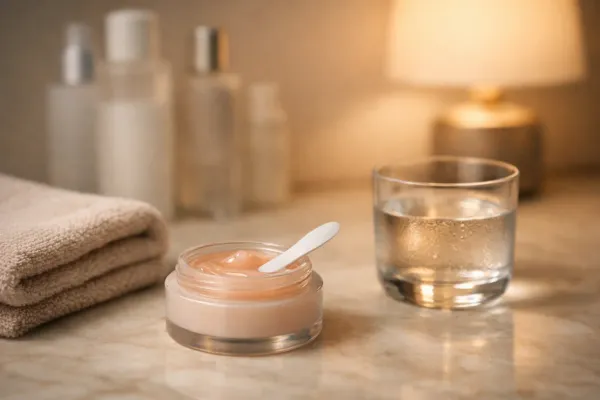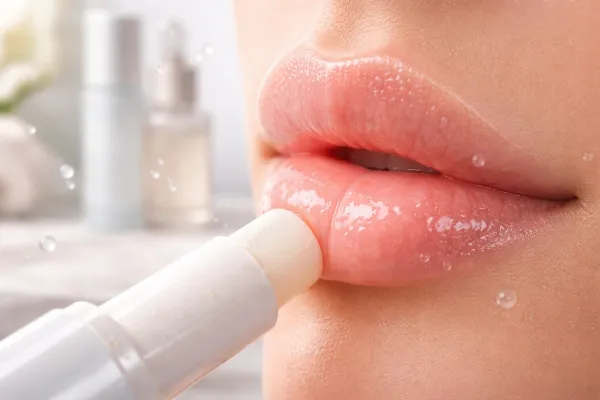7 Essential Ways Your Gut Health Impacts Your Skin's Radiance
Discover how gut health profoundly impacts your skin's radiance. Learn 7 essential connections, from inflammation to hormones, and get actionable steps to achieve clearer, healthier skin from within.

Your skin tells a story. Often, it's a direct reflection of what's happening deep inside your body. Specifically, your gut. A healthy gut means clear, vibrant skin.
Gut Health Impacts Your Skin’s Radiance — Quick Summary
Quick Picks
Gut Health Impacts Your Skin’s Radiance
- Add fermented foods (yogurt, kefir, kimchi) to boost beneficial bacteria linked with calmer, clearer skin.
- Increase fiber (oats, legumes, veggies) to feed gut microbes that support balanced sebum and reduced redness.
- Choose prebiotics (inulin, resistant starch, onions/garlic) to encourage SCFA production for a healthier skin barrier.
- Supplement smartly with clinically studied probiotics (e.g., Lactobacillus rhamnosus, Bifidobacterium lactis) for acne/eczema support.
- Prioritize omega‑3 fats (salmon, sardines, flax) to temper inflammatory pathways that dull skin glow.
- Load up on polyphenols (berries, green tea, cocoa) to counter oxidative stress that contributes to uneven tone.
- Hydrate consistently (water, herbal teas) to aid digestion and maintain skin plumpness.
- Dial down ultra‑processed, high‑sugar foods that can disrupt the microbiome and trigger breakouts.
- Manage stress (breathwork, walking, yoga) to reduce cortisol-driven flares via the gut–skin axis.
- Protect circadian rhythm (7–9 hours sleep) to stabilize gut microbes and overnight skin repair.
Tip: Introduce one change per week and track skin in a simple photo log.
Ignore your digestive health, and your skin might suffer. This article breaks down the powerful link between your gut and skin. You'll get clear steps to improve both.
The Link Between Gut Health and Skin in a Nutshell
Your gut and skin are deeply connected. They talk to each other constantly. Fixing your gut can dramatically improve your skin's look and feel.
Here are key benefits of a healthy gut for your skin:
- Reduced breakouts: Fewer pimples and acne.
- Calmer skin: Less redness and irritation.
- Better hydration: Skin holds moisture more effectively.
- Slower aging: Healthier gut bacteria can slow skin aging.
- Stronger skin barrier: Skin becomes more resilient.
Understanding the Fundamental Gut-Skin Axis
Think of your gut and skin as close relatives. They are constantly exchanging signals. This connection is called the gut-skin axis. It's a two-way street.
What happens in your gut affects your skin. What happens on your skin can even affect your gut. This axis links your digestive system to your skin's health.

Your gut is home to trillions of bacteria. This community is your gut microbiome. A balanced microbiome keeps your body running smoothly. When it's off, your skin often shows it. Bad gut bacteria can trigger skin issues. Good bacteria can help your skin thrive. Many experts in dermatology and gastroenterology now study this link closely.
Your gut affects your whole immune system. About 70% of your immune cells live in your gut. If your gut is not healthy, your immune system struggles. This can cause inflammation throughout your body, including your skin. A strong skin barrier depends on this internal balance.
- A healthy gut supports:
- Proper digestion: Nutrients are absorbed well.
- Reduced inflammation: Less irritation for your skin.
- Stronger immunity: Your body fights off problems better.
Understanding this fundamental axis is step one. Your skin's radiance starts from within.
Exploring the 7 Essential Gut-Skin Connections
Your gut and skin are tied together in many ways. Each connection plays a big part in how your skin looks. Ignoring these links means missing crucial steps for skin health.
Let's look at the seven key connections.
Inflammation: The Shared Pathway to Skin Issues
Inflammation is your body's response to damage. A problem in your gut can cause constant, low-level inflammation. This inflammation doesn't stay in your gut. It travels throughout your body.
Your skin is a common target for this internal stress. Skin conditions like acne and eczema often flare up due to inflammation. Fixing your gut helps calm this fire.
Immune System Regulation: Skin's First Line of Defense
Your immune system protects you. A large part of it lives in your gut. When your gut microbiome is balanced, your immune system is strong. It knows what to fight and what to leave alone.
If your gut bacteria are out of whack, your immune system can overreact. It might attack healthy skin cells. This leads to issues like skin sensitivity or rashes. A study by the NIH shows how gut health affects overall immunity.
Nutrient Absorption: Fueling Skin from Within
Your skin needs nutrients to stay healthy. Vitamins, minerals, and healthy fats are all key. You get these from your food. Your gut is responsible for absorbing them.
If your digestive health is poor, you won't get enough nutrients. Your skin suffers. It might look dull, dry, or lose its elasticity. Good gut health means your skin gets the fuel it needs.
Hormonal Balance: A Clear Complexion Connection
Your gut bacteria influence your hormones. Hormones play a big role in skin health. Imbalances can lead to problems like hormonal acne. The gut helps process and eliminate excess hormones.
When your gut doesn't do its job, these hormones can build up. This triggers breakouts and other skin woes. Want to know more about fixing this? Check out effective hormonal acne solutions.
Toxin Elimination: Detoxing for Dermatological Health
Your gut helps your body get rid of waste and toxins. A healthy gut lining acts like a filter. It keeps bad stuff from entering your bloodstream. If this filter is weak, toxins can leak through. This is called intestinal permeability.
These toxins can then show up on your skin. They cause irritation, redness, and breakouts. Clear skin often starts with a clear gut.
Microbiome Diversity: The Role of Good Bacteria
A diverse gut microbiome is a strong microbiome. It means you have many different types of good bacteria. Each type has its own job. A wide range of bacteria helps keep harmful ones in check.
When diversity is low, harmful bacteria can grow too much. This imbalance, called dysbiosis, can directly affect your skin's health. It impacts the skin barrier and its ability to protect itself.
Stress Response: The Gut-Brain-Skin Axis
Stress affects everything. Your gut and brain are in constant communication. This is the gut-brain axis. Your brain signals affect your gut, and your gut signals affect your brain. Skin is part of this network too. This is the gut-brain-skin axis.
Stress can change your gut bacteria. These changes can then show up on your skin. Managing stress helps your gut, which in turn helps your skin stay clear and calm.
Common Skin Conditions Linked to Gut Imbalance
Many common skin problems have roots in your gut. You might treat the skin, but the real issue could be internal. Addressing your digestive health can bring lasting relief.
Let's look at conditions often tied to gut issues:
- Acne: This is one of the most common links. A gut with too many bad bacteria or too much inflammation can trigger acne. The bacteria P. acnes can thrive when the gut is unbalanced. Foods to avoid for clear skin often target gut irritants.
- Eczema (Atopic Dermatitis): Many people with eczema also have gut problems. This skin condition often involves inflammation. Scientists are finding strong links between certain gut bacteria and eczema flare-ups. This is the eczema gut link.
- Rosacea: This condition causes redness and visible blood vessels. Gut issues like SIBO (small intestinal bacterial overgrowth) are often seen in rosacea patients. Treating the gut can often reduce rosacea symptoms.
- Psoriasis: An autoimmune condition causing thick, red patches. The immune system is heavily influenced by the gut. Dysbiosis and increased intestinal permeability are common in psoriasis.
- Dermatitis: General skin irritation and inflammation. It can stem from an overactive immune response driven by an unhealthy gut. Improving your gut microbiome can often soothe these irritations.
Dermatology experts are increasingly looking beyond topical creams. They now consider your internal environment. Your diet and gut health are key factors in how your skin behaves. Dr. Will Bulsiewicz, a well-known gastroenterologist, often speaks about this.
If you struggle with these conditions, look at your gut. It might be the missing piece in your skincare puzzle.
Actionable Strategies for Improving Gut Health for Better Skin
You want clear skin. The good news is, you can take action today. Improving your gut health isn't complicated. It's about small, consistent changes.
Here's what you can do:
- Eat More Fiber: Fiber feeds your good gut bacteria. Think fruits, veggies, whole grains. These are prebiotics. They help good bacteria grow.
- Add Fermented Foods: These foods contain probiotics, live good bacteria.
- Yogurt
- Kefir
- Sauerkraut
- Kimchi
- Take Probiotic Supplements: If diet isn't enough, consider a good probiotic. Look for diverse strains. Can probiotics improve skin? Many studies say yes, especially for conditions like acne and eczema according to Medical News Today.
- Reduce Inflammatory Foods: Cut back on sugar, processed foods, and unhealthy fats. These can cause gut inflammation. This in turn hurts your skin.
- Stay Hydrated: Water helps your digestive system work well. It also keeps your skin hydrated from the inside out. Your skin needs moisture.
- Manage Stress: Stress impacts your gut-brain-skin axis. Try meditation, walks, or deep breathing. Less stress means a happier gut and clearer skin.
- Sleep Enough: Quality sleep helps your gut repair itself. It supports overall bodily functions. Your skin uses this time to rejuvenate.
Focus on whole, unprocessed foods. These are often the best detox foods for radiant, blemish-free skin. Remember, good digestive health and skin go hand in hand.
Here's a quick look at common probiotics and their benefits:
| Probiotic Strain | Known Gut Benefit | Potential Skin Benefit |
|---|---|---|
| Lactobacillus acidophilus | Aids digestion, reduces bloating | May help with acne and eczema |
| Bifidobacterium lactis | Supports immune function | Could improve skin barrier function |
| Lactobacillus rhamnosus GG | Reduces gut discomfort, strengthens gut lining | Linked to reduced eczema severity |
| Saccharomyces boulardii | Fights bad bacteria, prevents traveler's diarrhea | May reduce skin inflammation and redness |
Expert Perspectives on the Future of Gut-Skin Research
The link between your gut and skin is no longer a fringe idea. Top experts now see it as central to health. Dermatology and gastroenterology are working closer together. They're finding new ways to treat skin issues.
Dr. Sara Gottfried, an expert on hormones and gut health, highlights this connection. She often discusses how specific foods impact both gut and skin. The scientific community is deeply invested in this area.
Scientists are researching microbiome skin connection more than ever. They are looking at how different gut bacteria affect skin aging. Some even study if specific probiotic strains can reduce wrinkles. This is exciting for the future of skincare.
Big companies like Procter & Gamble are investing in this research. They see the potential for new products. These products would work from the inside out. We might see more skincare that targets the gut, not just the skin surface.
The focus is shifting. It's moving from just treating symptoms to addressing root causes. This means more personalized approaches. Your unique gut microbiome might soon guide your skincare routine. This will help you get a healthy gut, clear skin.
- Future research areas include:
- Personalized probiotics: Tailored for your specific skin needs.
- Dietary guidelines: More precise advice for foods for gut and skin health.
- Skin barrier repair: Understanding how gut health strengthens it.
The future means fewer guesses and more targeted solutions for beautiful skin.
From the Field: A Personal Note
After over a decade in this field, one thing became clear to me. You can put all the fancy creams on your face you want. You can follow the perfect skincare routine for acne-prone skin. But if your gut is a mess, your skin will still struggle. My first big mistake was ignoring the inside.
I remember a client, Sarah. She had terrible, cystic acne. We tried everything topical for months. Nothing stuck. Her face was red, inflamed, and she felt hopeless. I almost gave up. Then, I suggested we look at her diet and gut.
It felt like a long shot for skin, back then. But we focused on adding fermented foods. We removed sugar and processed items, following a plan similar to how diet affects teenage skin.
Within six weeks, her skin wasn't perfect, but it was better. The redness was down. The cysts were fewer. It was the biggest change we had seen. Her gut was healing. Her skin followed. That was my 'aha!' moment. It proved the gut-skin axis is real, not just a theory.
Conclusion & Next Steps
Your skin is a window to your inner health.
The gut-skin axis is a powerful connection. Ignoring your gut means you're missing a huge piece of the puzzle for healthy, radiant skin. You now know the science behind this link.
You have seen the 7 key connections. You've learned about common skin conditions with gut roots. You also have clear, actionable steps.
Start today. Improve your digestive health and skin by focusing on fiber, probiotics, and stress reduction.
Your skin will reflect your effort from the inside out.
FAQ — gut health and skin
Quick answers to the most asked questions.
Your gut and skin talk through the gut–skin axis. When gut bacteria are off, inflammation and a weaker barrier can show up as acne, eczema flares, or redness. Support the gut and you often calm the skin. Start with more fiber, fermented foods, omega-3s, better sleep, and stress control.
Common signs: breakouts, flushing or rosacea-like redness, dry or dull skin, and itch from flare-prone conditions. You may also notice bloating, irregular stools, or food triggers. Track patterns for 2–4 weeks to spot links. Severe or fast-changing symptoms warrant a clinician visit.
They can help some people by supporting the gut barrier and immune balance. Try foods like yogurt, kefir, sauerkraut, or a quality supplement. Typical targets: 10–20 billion CFU daily for 4–8 weeks while dialing in diet and sleep. Keep it simple: 1 fermented serving/day plus plenty of fiber.
Plan on 4–12 weeks. The gut microbiome shifts over weeks, and skin turnover is ~4–6 weeks, so results lag. Measure progress with photos and a short symptom log. Stay consistent with food, stress, and sleep before judging the plan.
Hit 25–30g fiber/day from beans, whole grains, fruit, and veg. Add 1–2 servings of fermented foods (yogurt, kefir, kimchi) most days. Eat omega-3s (salmon, trout, sardines) 2–3x/week and load polyphenols (berries, olive oil, green tea). Cut ultra-processed foods, excess sugar, and heavy alcohol.




